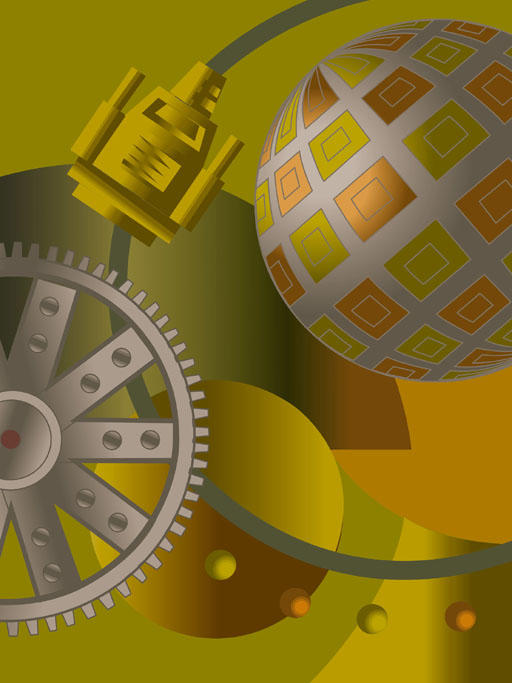Notes
from Chapter 1: Society
and Technological Change

The
ideas and examples referenced below are notes compiled by Robert Keel from his reading of Volti, Rudi. 2014. Society and Technological Change. 7th edition. New York, NY: Worth Publishers. They are intended for classroom
use.


The
Nature of Technology
Technology
—
Defining Technology
- "technology"
is a fairly new word — coined by Jacob Bigelow (Harvard, 1820's).
- technology —
techne (Greek) art, craft, or skill and logos: knowledge.
- teks (Indo-euro)
weave or fabricate.
- Technologies
are developed to help us do something we otherwise could not do.
- Our ability
to create technology sets us apart from other animals.
"Beavers build dams,
and chimps use sticks but no animal comes close to humans in our ability to
extend our natural environment through technology" (page 4)
"To
quarrel with technology is to quarrel with the nature of man— just as if
we were to quarrel with his upright gait, his symbolic imagination, his faculty
for speech, or his unusual sexual posture and appetite." (from J. Bronowski,
quote on page 4)
- Tools and techniques
have indisputably assisted the physical survival of the human race.
- But technology
has not spontaneously appeared. Certain elements have made technology possible:
- Organization—
development of technology requires a group effort.
- One individual
may be able to learn all the parts of a technology but one can not do
every task required to make a technology work.
- It's a System—
technology has to be supported by other components.
- This is
true of the technologies of handwriting as well as the modern airplane.
Definition
of technology: "A
system created by humans that uses knowledge and organization to produce objects and techniques for the attainment of specific goals." (page 6)
Above definition
has its limitations:
- The last part
of the definition assumes that technology comes about in order to meet existing
needs -- this is not always the case.
- History of technology
full of examples of inventions looking for problems to solve.
- New technology
often creates its own needs.
- Goals achieved
through technology don’t always have to be "practical" ones.
- New technologies
often developed as a symbol of prestige: Automobile — do we drive Yugos or Porsches?
Technological
Advance and the Image of Progress
- "The development
of technology is an inherently dynamic and cumulative process (page 7).
- Leaving aside
social concerns, technological change is usually one of continuous improvement
of existing technologies.
- We can always
make things better and faster.
- This dynamic,
progressive element of technology makes it a unique human endeavor.
- Other endeavors
do not have this characteristic: We still love Shakespeare, Beethoven, and
the Bible, BUT, yesterday's computer is a real drag.
- Technology represents
humankind’s dream of continual progress (maybe even creates the dream).
- Some countries
may be advanced technologically, but not in other human endeavors such as
equal distribution of goods and services and social justice.
- Nazi Germany
— developed the Mercedes but murdered millions of Jews and others.
- Primitive
societies — advanced artistry and social relationships, but little
technology as we think of it.
- Thus, the notion
of "progress" is complex and can only be understood in the context
of a given set of cultural beliefs and values.
- Four
Philosophies of Technology
Technology
as a Metaphor:
- Technology —
metaphor of our human notion of continual progress.
- Technology has
also shaped the way we think about ourselves and our world.
- Feedback
— principle in technology
- "A
method of controlling a system by reinserting into it the results
of its past performance." (page 11).
- It is
a regulation device, that when used will help an unbalanced system
gain its equilibrium.
- This
principle was incorporated into other areas of social life —
the stock market.
- And has been adapted to other areas as well--"audio feedback."
Technology
and Rationality
- Technology has
given us the belief that progress is a natural part of life.
- Underlying this
belief is a rational approach.
- A Technologically
progressive society is one in which problems are observed in systematic way
and, more importantly, that solutions to problems are possible. We
don’t view inclement weather as punishment from an angry God, we develop
methods to understand weather patterns and how to better deal with changes.
"A
rational approach to problem-solving is continuously concerned with identifying
and developing appropriate means for achieving of particular ends."
(page 12)
"With the
progress of science and technology, man has stopped believing in magic powers,
in spirits and demons; he has lost his sense of prophecy and, above all his
sense of the sacred. Reality has become dreary, flat and utilitarian, leaving
a great void in the souls of men which they seek to fill by furious activity
and through various devices and substitutes."(page 14, Julian Freund,
French Sociologist)
- Rationality
requires objectivity — coolness and detachment.
- This can make
for Technology that is not compatible with social beliefs and values. (See
Winner, "Do
Artifacts have Politics")(local
copy)
- Rationality and masculinity: male domain often ignores female contributions
Technological Determinism
- Technology is often believed to be an independent force in human life--one that enslaves us and may be out of our control.
- Whyte, Lynn. 1974. "Technology Assessment from the Stance of a Medieval Historian." The American Historical Review. Volume 79: 1. Pages 1-13.
- The "Social Construction of Technology" offers a different perspective.
- The reality is that technological development and social change occur symbiotically--there are probabilities and possibilities, and most importantly, reciprocity.
- Computers and the Internet.
- The importance of human agency.
- The element of power: Who controls
and understands technology is of key importance --This influences what technology
is or is not made available to the rest of us.
- "...technology has not operated as an agent independent of the society in which it is embedded." (page 16)
A Technological Society

- Technology
extends humanity's power and has improved lives, but is not without problems.
- Due to its
very nature, few us can actually understand it.
- Our lack of
understanding can render us powerless over it.
- True believers and wild conspiracy theories emerge (and some may not be so wild).
- There are always costs associated with the benefits of technology.
- Who decides?

Questions
(page 18):
- What recent
technology has produced the greatest benefit? Which has produced the greatest
harm? Are there harmful elements to beneficial technologies? Beneficial
elements to harmful technologies?
- Do all
technologies require tools or material artifacts, of some sort? Is bureaucracy
a form of technology?
- How do
you respond when a technological device you depend on malfunctions? What
attitudes towards technology do your responses reveal?
- Can you think
of technologies that were developed simply because of the challenge? Are these
sorts of technologies impractical? Can they be justified?
- Are technologies
"gendered?" On what basis can such distinctions be made?

Chapter
2

URL: http://www.umsl.edu/~keelr/280/soctechchange/soctech1.htm
Owner: Robert O. Keel: rok@umsl.edu
Last Updated:
Monday, February 1, 2016 10:35
![]()


![]()
![]()
![]()